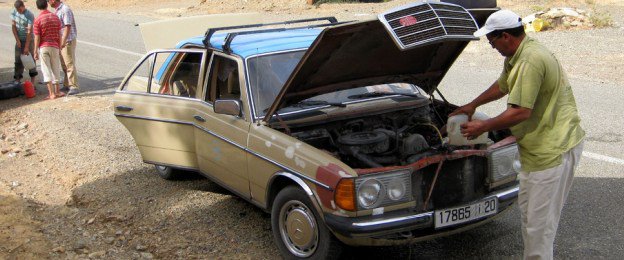
Engine Cooling System
If your car is overheating, it can be very serious. You shouldn't continue to drive if you see the temperature gauge has moved towards the "hot" side. Your car may not immediately explode or anything like that, but driving with an overheating engine can cause serious damage to your vehicle. It's better to pull over and deal with it right away instead of risking very expensive repairs later. There are a number of things that can cause your engine to overheat. Some of these are fairly common issues, especially on a hot summer day in the Phoenix, Tempe and Chandler areas.
Improperly Circulating Coolant
If the water/antifreeze mixture isn't circulating correctly, the engine will start to overheat. This mixture keeps your engine cool during the hot months and prevents it from freezing during the cold months. Be sure to check it regularly to avoid this. Even if you don't have any leaks, over time it can evaporate. You can add about half a cup of water to a low antifreeze tank to cool down your engine and get you to an auto shop.
There's A Leak
If your water/antifreeze levels are constantly low, there's a leak in your cooling system somewhere. If you're experiencing this, make an appointment with us today. We'll track down the leak and give you an affordable estimate for the repair.
A Hose Needs Replacing
Over time, the hoses that circulate your coolant may become blocked or detached. While it may not be completely blocked up, even a partial blockage can prevent the proper amount of coolant from circulating. Again, this is something we can check for during an inspection here in our shop.
Other Causes
If the levels of water and antifreeze appear normal, there may be a more serious malfunction with your engine. In this case, it's best to bring your car to an auto mechanic as soon as possible. We can track down issues that can help prevent more expensive repairs down the road.
What To Do if your Engine Overheats
If your engine is overheating, do the following to cool it down:
- Turn off the air conditioner. Running the A/C puts a heavy load on your engine.
- Turn on the heater. This blows some excess heat from the engine into the car. While it's not ideal on a hot summer day (which is when most vehicles tend to overheat), it does help cool the engine down.
- Put your car in neutral or park and then rev the engine. This makes the fan and the water pump work faster, which pulls more air and more water through your car's radiator. This increased circulation cools down the engine.
- Pull over and open the hood. This releases the heat and lets air circulate through the hot engine. Just be careful when opening the hood—hot steam may come blasting out.
And finally, NEVER attempt to remove the radiator cap while the engine is hot. It can result in serious burns all over your body as the hot coolant sprays forth under tremendous pressure. If you have concerns about any of the things considered in the article,
Elite Auto Repair is always ready to help. Call right away and we'll discuss your options. You can also use the Book an Appointment button above to schedule with us.
Book An Appointment